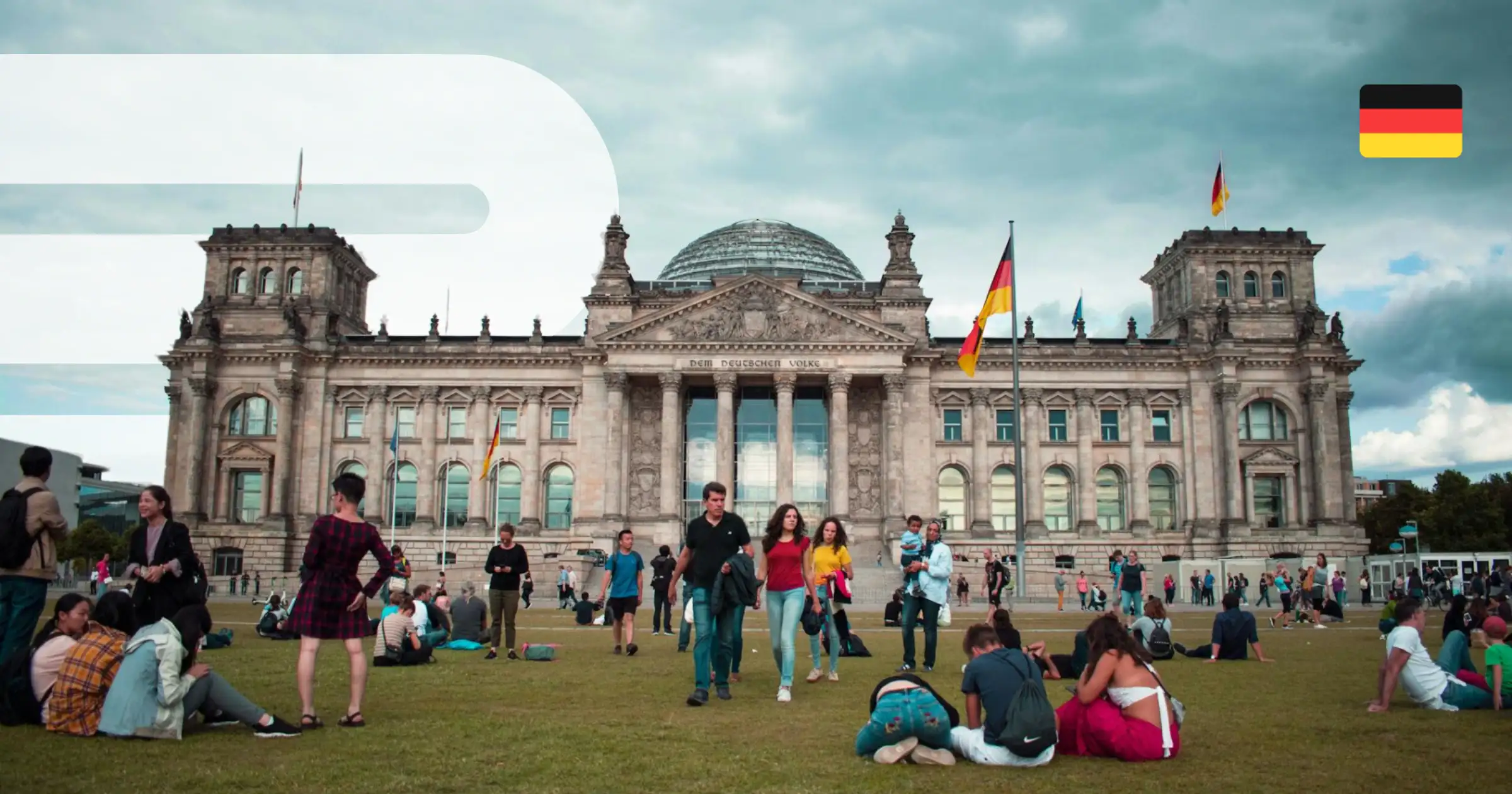As of August 26, 2025, Berlin’s Landesamt für Einwanderung (LEA) allows non-EU nationals to digitally extend their Aufenthaltserlaubnis aus humanitären Gründen (residence permit on humanitarian grounds) via the Online-Antrag portal . Berlin’s Landesamt für Einwanderung (LEA) now offers a digital process to extend Aufenthaltserlaubnis aus humanitären Gründen (humanitarian residence permits) as of August 26, 2025. Here’s a simple overview:
- What: Extend permits under Sections 22, 23, 23a, 24, 25, 25a, 25b of the Aufenthaltsgesetz (AufenthG).
- Who: Non-EU nationals with humanitarian grounds (e.g., refugees, asylum seekers, medical/family reasons).
- How: Use the Online-Antrag at Berlin website.
As of August 26, 2025, the Landesamt für Einwanderung (LEA) in Berlin has introduced a significant update for non-EU nationals seeking to extend their Aufenthaltserlaubnis aus humanitären Gründen (residence permit on humanitarian grounds). This process can now be completed digitally, streamlining the application procedure and making it more accessible for eligible individuals. This article explores the new online application system, the legal grounds for granting humanitarian residence permits, and key steps to ensure a successful application.
What is a Residence Permit on Humanitarian Grounds?
A residence permit on humanitarian grounds is issued to individuals who face exceptional circumstances that justify their stay in Germany, even if they do not meet standard immigration requirements. According to the German Residence Act (Aufenthaltsgesetz, AufenthG), such permits are granted under specific sections based on humanitarian considerations. The primary legal grounds include:
- Section 22 AufenthG: Admission for humanitarian or political reasons, typically by order of the Federal Ministry of the Interior or a higher federal authority.
- Section 23 AufenthG: Admission ordered by the state of Berlin or the Federal Ministry for urgent humanitarian reasons or international law obligations.
- Section 23a AufenthG: Hardship cases where economic activity or exceptional circumstances justify continued stay.
- Section 24 AufenthG: Temporary protection for refugees, such as those fleeing the war in Ukraine, as per the Ukraine-Aufenthalts-Übergangsverordnung.
- Section 25 AufenthG: Includes several sub-sections:
- Sub-sections 1 and 2: Recognition as entitled to asylum or refugee status by the Bundesamt für Migration und Flüchtlinge (BAMF), or a deportation ban due to risks in the country of origin.
- Sub-sections 3 or 5: Obstacles to departure, such as medical conditions or family ties (e.g., minor children or spouses in Germany), supported by proof like medical certificates or family documentation.
- Section 25a AufenthG: For minors who have integrated into German society and meet specific criteria.
- Section 25b AufenthG: For individuals who have resided in Germany for a long time and demonstrate integration.
These grounds ensure that individuals facing persecution, war, or other significant hardships can legally remain in Germany. For detailed legal information, visit the official Aufenthaltsgesetz page on the Federal Ministry of the Interior website.
The New Digital Application Process
The Berlin Immigration Office has modernized the process for extending residence permits issued under Sections 22, 23, 23a, 24, 25, 25a, or 25b of the AufenthG. Applicants can now submit their Online-Antrag (online application) through the official portal at www.berlin.de/einwanderung. This digital solution eliminates the need for in-person submissions via contact forms, letters, or emails, which are now processed secondarily due to organizational constraints.
Key Steps in the Online Application Process
- Submit the Online Application: Use the dedicated Online-Antrag für Verlängerung (online application for extension) on the LEA website. Ensure all required documents, such as a valid passport or proof that a passport cannot be obtained, are uploaded. For permits under Section 25 (sub-sections 3 or 5), provide evidence of ongoing obstacles to departure, such as medical certificates or proof of family ties.
- Receive Confirmation: After submission, you’ll receive a PDF document confirming your application. Save and print this document, as it serves as proof of your legal residence status (Fiktionswirkung) until your appointment, allowing you to continue working or studying.
- Pay Fees: If applicable, the LEA will send a payment request via email. Fees vary depending on the permit type and applicant’s age. For example, reissuing a travel document for refugees or stateless persons costs €70 for adults over 24, €38 for those under 24, and €14 for children under 12. Pay within 14 days to avoid delays.
- Wait for Review: Due to high application volumes, processing may take time. The LEA advises against status inquiries to expedite processing.
- Attend an Appointment: If approved, you’ll receive an email with an appointment date at Keplerstraße 2, 10589 Berlin. Bring original documents and pay any remaining fees. The electronic residence permit (eAT card) is typically issued within 4–8 weeks after the appointment.
Important Notes
- Family Applications: Each family member, including spouses and children, must submit a separate online application.
- Travel Documents: Holders of permits under Section 25 (sub-sections 1 and 2) can apply for a new travel document for refugees alongside the permit extension.
- Timely Submission: Apply 4–6 weeks before your current permit expires to avoid legal complications. Early submission ensures your residence remains lawful under Fiktionswirkung.
For more details, check the official LEA guidelines at www.berlin.de/einwanderung.
Eligibility and Required Documents
To extend a humanitarian residence permit, the original grounds for the permit must still apply. For instance, if your asylum or refugee status has been withdrawn or the obstacle to departure no longer exists, the permit cannot be extended. Additionally, the permit must have been issued by the Berlin Immigration Office, not another regional authority.
Required Documents :
- Application Form: Complete the “Antrag auf Verlängerung einer Aufenthaltserlaubnis” (available on the LEA website).
- Valid Passport: Provide a color scan of the data page. If unavailable, submit proof that a passport cannot be obtained from your home country’s authorities.
- Biometric Photo: Starting May 1, 2025, photos must be taken at certified studios or LEA self-service terminals for secure digital transmission. Exceptions may apply for Ukrainian refugees or those with temporary suspension of deportation (Duldung).
- Proof of Address: Submit a Meldebestätigung (registration certificate) or Wohnungsgeberbestätigung (landlord confirmation).
- Additional Proof: For permits under Section 25 (sub-sections 3 or 5), include medical certificates or family documentation. For employed applicants, provide an employment contract, recent salary slips, and proof of pension contributions.
Always verify requirements on the LEA website, as they may vary based on your specific case.
Why This Matters for Applicants
The shift to a digital application process reflects Germany’s commitment to modernizing immigration services, reducing bureaucratic hurdles for refugees and those with humanitarian needs. By using the Online-Antrag, applicants save time and avoid delays caused by manual submissions. The Fiktionswirkung ensures continued legal status, allowing you to work, study, or access benefits while awaiting approval. This is particularly crucial for Ukrainian refugees under Section 24 AufenthG, whose permits are valid until March 4, 2026, per the latest ordinance.
Tips for a Smooth Application
- Apply Early: Submit your application 4–8 weeks before your permit expires to account for processing delays.
- Check Email Regularly: LEA notifications, including payment requests and appointment details, are sent via email. Check your spam folder to avoid missing updates.
- Use Official Channels: Avoid using contact forms, letters, or emails for extension requests, as these are processed with lower priority.
- Seek Assistance: For complex cases, consult the LEA’s contact form or seek advice from organizations like studierendenWERK BERLIN for international students or refugees.
Who is Jobbatical for?
At Jobbatical, we combine smart automation with real immigration experts to move companies their employees easily, quickly, and compliantly. We make sure that for international hires, companieget complete peace of mind and a smooth, fully supported visa and immigration experience, ensuring For their business, time savings, cost reductions, and guaranteed compliance.
We do not specialize in resettlement program or asylum cases . For this, we would request you to visit the Berlin Immigration Office website and apply there. However, Jobbatical can actively help with legal guidance and application for residence permits and their extensions/renewals in Berlin.
Conclusion
The introduction of the digital application for extending Aufenthaltserlaubnis aus humanitären Gründen marks a significant step toward efficiency and accessibility in Berlin’s immigration system. By understanding the legal grounds—Sections 22, 23, 23a, 24, 25, 25a, and 25b of the AufenthG—and following the online process, applicants can ensure a smoother experience. For the latest updates and to start your application, visit the Berlin Immigration Office website. Stay proactive, submit early, and leverage Germany’s digital tools to secure your legal stay.
Jobbatical does not specialize in resettlement program or asylum cases. However, Jobbatical provides guidance and end-to-end application management for residence permits and their extensions/renewals in Berlin.
Disclaimer
Immigration laws and policies change frequently and may vary by country or nationality. While we strive to provide accurate and up-to-date information, we recommend doing your own due diligence or consulting official sources. You’re also welcome to contact us directly for the latest guidance. Jobbatical is not responsible for decisions made based on the information provided.


.svg)










.svg)
